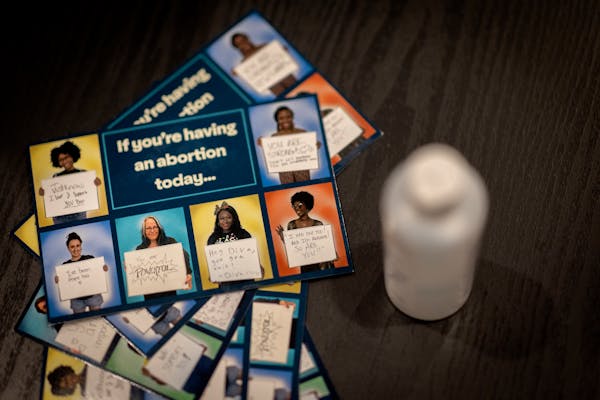DULUTH The ringing phones, the doorbell, the buzzing outdoor music drowning out protesters: these were the consistent sounds at the only abortion clinic in northern Minnesota on Thursday, the first day of procedures since the Supreme Court overturned Roe v. Wade.
Twenty-two appointments filled the day's calendar — a 25% increase from a typical week. The staff of Duluth's WE Health Clinic worked at a brisk pace, ushering patients from their ultrasounds to lab work to their time with the doctor.
"This many patients is a lot for our staff of 6 to 10," said Cassidy Thompson, a patient educator. "It's going to be a little chaotic today."
The independent nonprofit abortion clinic — one of only four in the state that perform suction terminations — had anticipated the moment that the 50-year-old federal law would be overturned, leaving abortion rights up to individual states. Clinic leaders knew that with Minnesota's protected status, they would feel the impact, and on Thursday, staff members worked long hours, fielded dozens of calls and wondered what was to come.
"Right now it's hard to plan for the future," said Laurie Casey, executive director of the clinic. "It's uncharted territory."
Along with being the only abortion provider north of the Twin Cities metro, it's the closest provider for northern Wisconsin and Michigan's Upper Peninsula. With the Supreme Court decision, South Dakota abortions immediately became illegal, North Dakota's will end soon, and other nearby states are in flux with disputed laws.
"We are only at the very beginning of what we are going to see," said Megan Peterson, executive director of Gender Justice in St. Paul, a nonprofit that fights for gender equity.
'We were ready today'
A handful of women sat quietly in the waiting room Thursday morning, scrolling on cellphones or talking softly. One nervously tapped her foot until she was called in.
Among them was Duluth resident Alexis Richison, a 24-year-old mother of two young children who sought an abortion for an unplanned pregnancy. She said in an interview following her procedure that she wept for the millions of women who no longer have the choice she was able to freely make.
"I think abortion access is very important for anyone who doesn't feel like they are ready to be a parent, can't financially or mentally support a child, or even straight up don't want to," she said.
A handful of abortion rights rallies erupted in Duluth earlier this week. At the clinic Thursday, six protesters against abortion lined the sidewalks — fewer than expected; 20 patient escorts were on hand.
Thompson, who leads the escort program, peeked out a second-story window onto the street often throughout the morning, communicating once by walkie-talkie to the escorts below on whether a certain problematic protester was there.
"It's beautiful," she said, that numbers were low. "We were ready today, but great; go home, relax. Your work is over."
The mood at the clinic — its walls lined with feminist art — was somber as lab techs, nurses, a doctor and volunteers went about their work, quietly huddling over charts, ultrasound images and schedules.
"It's unfair and it's unconscionable that your geographic location determines how easily it's going to be for you to get this care, and it's going to affect those hardest hit already, marginalized groups," said Paulina Briggs, lab supervisor for WE Health.
Since the Supreme Court decision, the clinic has been inundated with people wanting to donate or volunteer, some offering patients a place to stay or rides. Staff members hope that momentum carries forward as needs become clearer in the coming months.
The 40-year-old clinic, which offers abortions once a week, performed nearly 500 in 2021, including in-clinic terminations and telemedicine abortions, which the clinic began offering in September. Abortion medication can be mailed to Minnesota residents who are nine weeks pregnant or less.
The clinic expects to perform at least another 50 abortions this year. The jump in demand has leaders considering an additional half day per week and perhaps another full day per month. More doctors are being sought to supplement the three who already provide abortions, said Dr. Judith Johnson.
But the medical community has long marginalized abortion care, she said, with many "anti-abortion doctors and hospital administrators who don't consider it a normal part of pregnancy care, which it is," she said.
Direct flights from Texas, where abortion is largely banned, is leading more women to Minneapolis and St. Paul, clinic workers say. That's affecting more patients from southern parts of Wisconsin and Minnesota and South Dakota to Duluth as demand and wait times grow, some as long as four weeks. One 26-year-old woman, a single mom of one who declined to give her name, drove two hours north to Duluth to receive a medication abortion Thursday, at nine weeks pregnant.
She preferred traveling to the smaller Twin Ports than the Twin Cities, she said.
Johnson, sitting with the woman in an exam room, went over in painstaking detail what she would be taking and how to take it, what it would do and her aftercare. The woman received financial assistance from the clinic, which does fundraising to support its mission of helping underserved patients.
The cost of an abortion at the clinic can range from $412 to $974, depending on the procedure and timing. Medical assistance reimbursements don't cover all clinic costs, Johnson said, so "money is a big struggle."
Ultimately, only 14 appointments were kept Thursday. But that choice is one all women should have, Richison said, as the keepers of their own reproductive health.
As Richison recovered in a recliner with a Diet Coke, Johnson asked her if she wanted to see the fetal tissue.
"Send it to the Supreme Court," Richison replied.

Teen suspect in Nudieland mass shooting arrested on murder, assault charges
'Human error' behind Robbinsdale shelter-in-place alert that was mistakenly sent countywide

Going to Wolves or Twins tonight? How to get there (and maybe avoid traffic).
Focusing on bringing football film into frame

